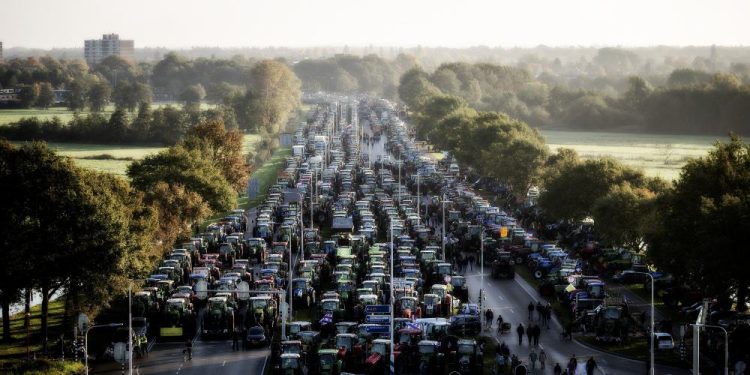The Hague, the seat of the ruling class in the Netherlands, has declared a state of emergency to prevent farmers from driving their tractors into the city to protest the government’s mandatory fertilizer reduction targets. Farmers say that their rights and freedom are being trampled on by a totalitarian system of rule we all know as “democracy.”
Democracy worldwide is, even if run perfectly, nothing more than mob rule and nothing less than slavery. All freedom is an illusion as long as governments exist, people will be deluded into being their slaves.
The organizers of Thursday’s protest are the Farmers Defence Force. They said the state of emergency was a way to squash their democratic rights and freedom of assembly. Of course, their government, like all governments, sees them only as slaves meant to obey, so they don’t care about rights or freedom. The rulers think they own their slaves. It would be like believing your cow has a right to vote to keep it from being eaten. The notion of government gets more absurd by the day and yet, slaves still hold the system that’s oppressing them up.
Subtitled!!
This is Jolanda Nooijers a Dutch Farmer.
She tells what is happening today and what they have planned in back rooms and pushed laws through against any consentThey are planning on doing this all over the world , so this is a heads up to those abroad to stay… pic.twitter.com/oQCqBHqgWg
— The Keystone Channel (@TKCrecovered) June 26, 2023
The Dutch farmers have decided to disobey and make their way to The Hague to protest regardless of the state of emergency. Although, if they intend to disobey the state of emergency, why not just disobey the unjust law they are protesting? Begging the master for longer chains never works, and if it does, it’s only temporary. The way to end it is to remove the system that’s putting chains on people.
Netherlands 🇳🇱 Anti Nitrogen Cuts, Anti Govt Lies 🔥 Here they come again.. The Farmers En Route to The Hague in solidarity against proposed restrictions that threaten their industry….𝘿𝙤 𝙒𝙝𝙖𝙩𝙚𝙫𝙚𝙧 𝙔𝙤𝙪 𝘾𝙖𝙣 𝙏𝙤 𝘿𝙞𝙨𝙧𝙪𝙥𝙩 𝙏𝙝𝙚𝙞𝙧 𝙋𝙡𝙖𝙣𝙨….🔥 pic.twitter.com/Kl2jNWTwCT
— 𝙍𝙄𝙎𝙀𝙈𝙀𝙇𝘽𝙊𝙐𝙍𝙉𝙀 (@Risemelbourne) June 30, 2023
The Netherlands 🇳🇱 is the world’s 2nd biggest exporter of farm produce, yet the Dutch government are sabotaging their own farmers. Dutch government proposals for tackling nitrogen emissions mean an estimated 11,000 farms will close.#NoFarmsNoFood
— James Melville 🚜 (@JamesMelville) June 30, 2023
“The Netherlands has for years missed its climate goals. Now it’s time for a great leap forward,” Jetten said, calling the package “ambitious.” He presented 120 different measures which he said would make sure CO2 emissions in the Netherlands will be 55 percent lower than in 1990 by 2030.
The Dutch government can reportedly spend 28 billion euros to reduce the temperature on Earth by 0.000036 degrees. This would mean that each resident would have to contribute about 1,647 euros and a family of four about 6,588 euros., News Facts reported. -The Daily Exposé
Greenpeace co-founder Dr. Patrick Moore explained how globalist rulers, including Klaus Schwab and the United Nations, are using the climate scam as an excuse to cut off fossil fuels and nitrogen fertilizer, to deliberately depopulate the planet.
In a broad-ranging discussion including whether the earth is headed for another ice age, the maximum number of people the globe can handle, what would happen if the population were to double in size, whether our masters care about the future or just their time lording power over others and the importance of sustainable energy, Dr. Moore said:
“Carbon dioxide [and] temperature [ ] are actually slightly negatively correlated in the long historical record. In other words, it is not a cause-effect relationship … There is no historical relationship between the level of CO2 in the atmosphere and the temperature of the earth … The climate has changed long before humans could have been any factor in it. It’s been changing all through the history of the earth.”
Article cross-posted from SHTF Plan.
Don’t just survive — THRIVE! Prepper All-Naturals has freeze-dried steaks for long-term storage. Don’t wait for food shortages to get worse. Stock up today. Use promo code “jdr” at checkout for 25% off!
- Gold SKYROCKETED during Trump’s first term and is poised to do it again. Find out how Genesis Precious Metals can help you secure your retirement with a proper self-directed IRA backed by physical precious metals.





Climate mandates are pure manure.